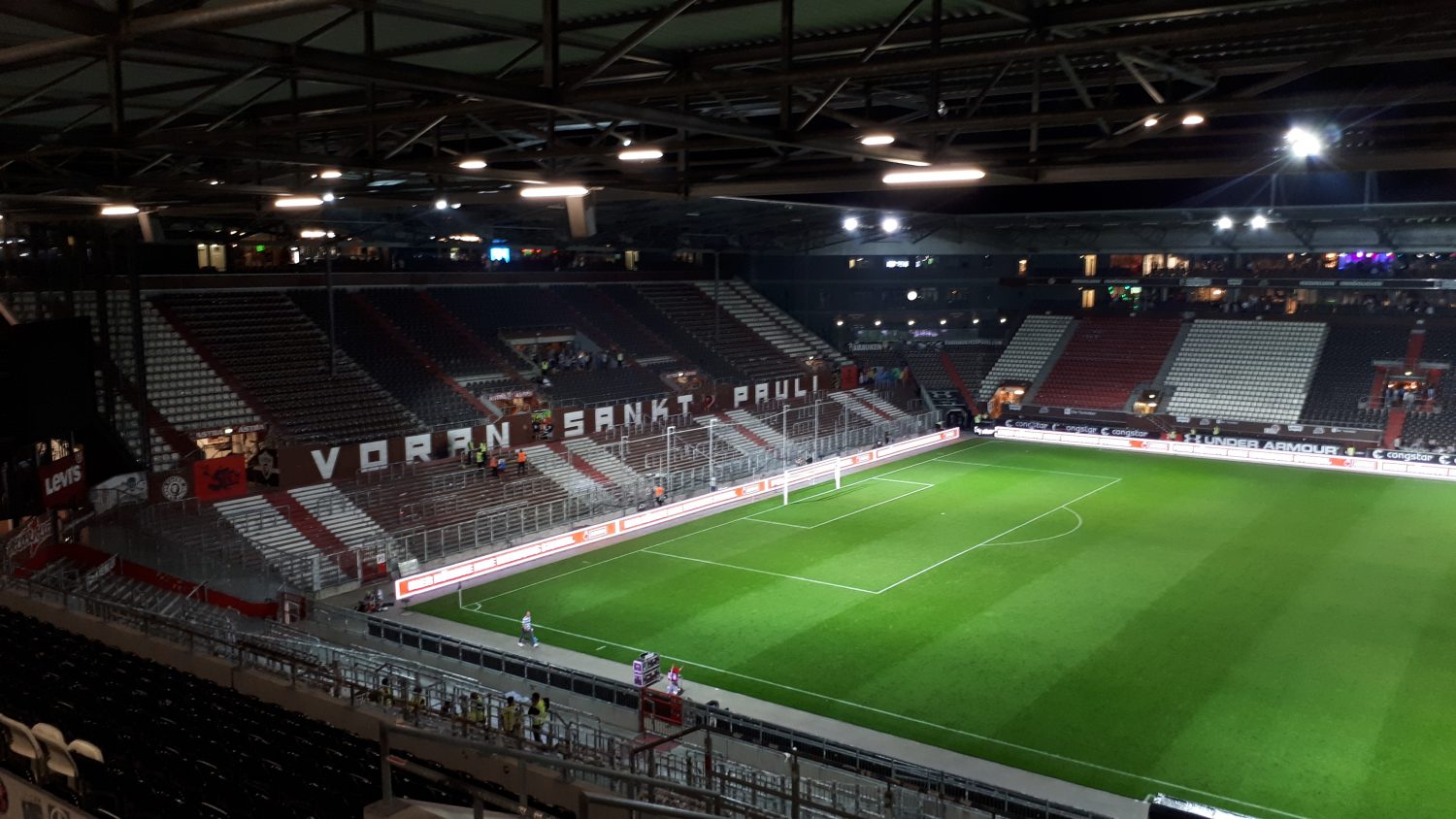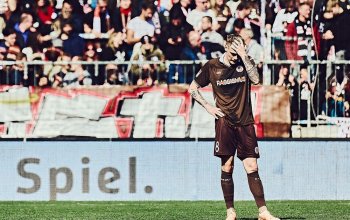Die Entwicklungen sind momentan ziemlich rasant und es besteht durchaus die Möglichkeit, dass dieser Text innerhalb weniger Stunden oder gar bereits kurz nach der Veröffentlichung überholt ist, da schon andere Entscheidungen getroffen wurden. Trotzdem treibt mich diese Frage um, seitdem am Sonntag mehr oder minder klar wurde, dass es wohl für einige Zeit zu Geisterspielen in den Bundesligen kommen könnte. Ich frage mich: Macht es überhaupt Sinn diese Spiele dann noch durchzuführen? Zu welchem Zweck? Und das führt auch ganz schnell zu der Frage, für wen eigentlich Fußball gespielt werden soll.
Vorweg: Es gibt momentan wichtigere Fragen als die nach der Art und Weise der Austragung von Fußballspielen. Da dies hier aber ein Fußball-Blog ist, befasse ich mich hier mit eben jener Thematik. Und um es deutlich zu machen: Ich bin kein Virologe, schon gar kein Epidemologe, habe von Medizin wirklich wenig Ahnung. Es scheint aber zumindest so, dass der Ausbruch des Coronavirus in Italien um etwa eine Woche dem in Deutschland voraus ist. Und das scheint auch die Entscheidungen im Umgang mit dem Coronavirus zu betreffen. In Italiens Serie A wurden im Norden, wo die Zahl der Infektionen besonders hoch ist, zuerst Geisterspiele angesetzt. Inzwischen, genauer seit Montagabend, wird der Spielbetrieb und allgemein alle Sportveranstaltungen bis mindestens 3.April ausgesetzt, da die Zahl der Infektionen weiter exponentiell ansteigt.
Nun frage ich mich, ob mein laienhaftes Verständnis mich hier in die Irre führt oder aber, ob der Bundesliga das gleiche Schicksal droht, nur mit ein wenig zeitlichem Versatz. Sicher kein unwahrscheinliches Szenario. Und wenn ihr diesen Gedanken mal weiterführt, dann kommt ihr auch recht schnell zu der Frage, die sich auch die Verantwortlichen der DFL und weiteren Institutionen stellen: Macht es überhaupt Sinn die Liga weiterzuführen, zur Not mit Geisterspielen, bis es eben nicht mehr geht? Für wen wird dann Fußball gespielt? Ganz plakativ gesagt, gibt es genau zwei Faktoren für die grundsätzlich gespielt wird und die stehen sich bei der momentanen Thematik komplett konträr gegenüber: Fans und Geld.
Da Fußball und Sport im Allgemeinen nichts mehr (aber auch nicht weniger) erzeugt als Emotionen, braucht er auch Menschen, die diese Emotionen erleben wollen. Das macht man beim Fußball natürlich am besten im Stadion. Welchen Wert hat der Aufstieg Deines Lieblingsklubs, wenn Du nicht im Stadion dabei sein kannst? Klar, immer noch einen hohen Wert, aber eben sicher einen geminderten. Zumal bei Szenarien, die das Verbot von größeren Ansammlungen von Menschen beinhalten, auch das gemeinsame Erlebnis des Fußball-Schauens außerhalb eines Stadions nicht stattfinden wird. Wieder richtet sich der Blick nach Italien, wo das bereits der Fall ist.
Bleibt also in solchen Fällen der heimische Fernseher. Moment, Du hast kein Sky-Abo? Na, dann in die Kneipe… ach, Moment, unbekannte Menschenmenge. Schwierig.
Dann bleibt wohl nur das gute alte Radio (abgesehen von anderen Möglichkeiten des großen weiten Internets). Nostalgie der Radio-Reportagen und Qualität jener Reporter*innen (lassen wir das AFM-Radio hier mal außen vor) hin oder her, sowas ginge wohl auch für die meisten einher mit einer Minderung der Emotionen, die Tore unseres Klubs bei uns auslösen.
Und noch etwas beschäftigt mich, auch wenn es mich nicht betrifft und bei der allgemeinen Lage eher nebensächlich erscheint: Es gibt in Deutschland eine nicht unerhebliche Anzahl von Allesfahrer*innen, die ein Geisterspiel wohl noch etwas heftiger treffen würde, als jene von uns, die sich bei zu weiter Auswärtsfahrt auch gerne vor den Fernseher oder das Radio setzen. Da können Serien reißen, die teilweise schon Jahre oder gar Jahrzehnte andauern. First World Problems, schon klar.
Zusätzlich fehlt es Geisterspielen allein schon deshalb an Emotionen, weil eben jene „Stadion-Atmosphäre“ komplett fehlt. Das haben auch bereits ehemalige Profis ausgeführt, dass sich das dann eher wie ein Testkick im Wintertrainingslager anfühlt. Sicher würde das auch das Erlebnis vor dem Fernseher oder Radio mindern.
Für die Fans sind Geisterspiele also sicher nicht gemacht. Bleibt also noch das Geld. Und, na klar, hier erklärt sich ziemlich schnell, warum die DFL die Saison trotz der Widrigkeiten auf Biegen und Brechen zu Ende bringen will. Denn ein Aussetzen der Saison würde sicherlich mit finanziellen Einbußen einhergehen, da TV-Gelder nicht fließen. Und entsprechend möchte die DFL den Spielplan auch auf jeden Fall bis Ende Mai durchziehen, da ab dann die Abstellungsfrist für die Europameisterschaft gilt. Wenn bis dahin keine Entscheidungen bezüglich der Ligazugehörigkeit gefallen sind, dann wird es schwierig mit der neuen Saison. Da die Klubs auf ein regelmäßiges Einkommen angewiesen sind, kann so eine Planungsunsicherheit samt finanzieller Einbußen schon zu richtig großen Problemen führen (sicher noch viel mehr in den unteren Ligen). Der Anteil an den Einnahmen durch den Verkauf von Tickets liegt übrigens in der 1.Liga bei 13% und in der 2.Liga bei 17%. Es ist natürlich davon auszugehen, dass dieser Anteil zwischen einzelnen Klubs massiv variieren kann.
Ihr wisst ja bereits, dass ich mit Medizin nichts am Hut habe. Gleiches gilt auch für Ökonomie. Und vielleicht habe ich auch hier einen massiven Denkfehler, aber ich frage mich gerade, ob es für einen Klub schlimmer ist, wenn er bis Ende Mai nicht weiß in welcher Liga er nächste Saison spielt oder wenn er bis dahin etwa fünf Heimspiele ohne Zuschauereinnahmen finanziell abfedern muss? Diese Abwägung ist einer der Knackpunkte und es gibt bei beiden Entscheidungen Verlierer. Eine ganz vorsichtige Schätzung, die bereits knapp zehn Jahre alt ist, geht von 110.000 Beschäftigungsverhältnissen im Zusammenhang mit den Bundesligen aus. Tendenziell sind heutzutage wohl eher mehr. Es geht also um eine Menge Jobs und natürlich nicht primär um die der wohlverdienenden Kicker der ersten beiden Ligen. Es geht da eher um den Caterer, der den Ballsaal mit Essen beliefert oder den Dienstleister, der den Ordnungsdienst im Stadion stellt. Wie gut können die den Ausfall von fünf Spielen abfedern, den es auch schon bei der Durchführung von Geisterspielen gäbe? Auf der anderen Seite stellt sich die Frage, wie gut die gleichen Firmen und Beschäftigten ggf. fehlende Aufträge aus den Bundesligen aushalten bis der ganze Betrieb wie bisher weiterläuft. An dieser Frage sollten sich Ökonomen ganz schnell den Kopf zerbrechen, bevor womöglich die falsche Entscheidung getroffen wird.
Ohne Euch eine zufriedenstellende Antwort zu liefern, haue ich hier jetzt mal meine Vorstellung raus: „Das Saisonende soll dann ausgespielt werden, wenn es wieder möglich ist, dass Zuschauer in die Stadien dürfen„. Denn nur wenn Spiele nachgeholt werden, können die Klubs und Dienstleister im Bundesliga-Betrieb Einnahmen generieren. Für die Zeit in der keine Spiele möglich sind (bzw. momentan anscheinend Geisterspiele angedacht sind), muss eine Lösung gefunden werden, die auf anderen Ebenen bereits formuliert wurde (Stichwort: Überbrückungskredite) Das würde ich sofort unterschreiben, denn Fußball sollte für Fans da sein und keinen Selbstzweck erfüllen.
Da nahezu alle Ligen rund um den Globus diese Probleme haben, stelle ich mir vor, dass Spielpläne auch global angepasst werden können. Gerade im Hinblick auf internationale Wettbewerbe sollten sich die Verbände bei dieser Frage abstimmen und nicht alle ihr eigenes Süppchen kochen (im Hinblick auf die EM sicher noch sinnvoller). Und auch mit Blick auf Vertragslaufzeiten von Spielern, wäre das mehr als sinnvoll, da es sicher zu der ein oder anderen Saisonüberschreitung dadurch kommt. Und da die DFL ja bekannt dafür ist, meist erst wenige Wochen vor dem Spiel dieses auch zeitgenau anzusetzen, sollte ein wenig Spontanität möglich sein. Das Problem hierbei ist aber natürlich auch, dass ein komplettes Aussetzen der Bundesligen (oder späteres „Nachspielen“) eine langfristige Entscheidung wäre. Da aber anscheinend niemand so wirklich abschätzen kann, wie die Lage z.B. im April ist, könnte es dann eben eine schlechte Entscheidung gewesen. sein, wenn dann ein geregelter Spielbetrieb wieder möglich wäre.
In diesem Text lest ihr häufig den Konjunktiv. Das liegt daran, dass es wahnsinnig schwer ist abzuschätzen, wie sich die Situation entwickelt. Und die DFL fährt hierbei leider einen Schlingerkurs und versucht die Verantwortung auf die Länder bzw. die Klubs abzuschieben bzgl. der Frage Geisterspiel/Absage/so-wie-immer, indem sie schreiben „Sollte es keine anderslautenden Verordnungen der Behörden vor Ort geben, dann werden die Begegnungen des kommenden 26. Spieltags in beiden Ligen ausgetragen„. Das ist fatal, denn so kämen wir ziemlich schnell in den Bereich der Wettbewerbsverzerrung. Denn wie Leipzig-Trainer Julian Nagelsmann richtig anmerkt sollte man nicht unterscheiden „zwischen Bundesländern, wo mehr Infizierte aktuell leben und zwischen Bundesländern, wo weniger Infizierte leben„. Das würde zu einem unfairen Wettbewerb führen. Und da das Bundesland Bayern bereits Nägel mit Köpfen gemacht hat, bleibt vor diesem Hintergrund zumindest für den kommenden Spieltag eigentlich nur die Lösung „Geisterspiele“.
Wie man es dreht und wendet, es werden schwierige Zeiten auch auf den Fußball zukommen. Und natürlich muss man sich die Frage stellen, ob es überhaupt Sinn macht den Betrieb fortzuführen, wenn es offensichtlich gerade ganz andere, wichtigere Themen gibt, die mehr Aufmerksamkeit verdienen. „The show must go on„, nur damit in Zukunft auch weiter ein jetzt geplanter Rahmenterminkalender durchführbar ist, erscheint mir hierbei ein falscher Ansatz.
// Tim
Alle Beiträge beim MillernTon sind gratis. Wir freuen uns aber sehr, wenn Du uns unterstützt.
MillernTon auf BlueSky // Mastodon // Facebook // Instagram // Threads // WhatsApp // YouTube
{:}{:en}As the developments about Corona are currently pretty quick there’s a fair chance that this text might be obsolete within hours or is even obsolete upon arrival as further decisions might have been taken. Nevertheless, as it became rather clear on Saturday that matches behind closed doors might happen, I am curious about these developments. I am wondering: Is it reasonable at all to proceed with football matches? For what reason? And this inevitably leads to the question for whom football should actually be played for.
To start with: There are currently many more concerning questions than to discuss in which way football matches should proceed. But as this is a blog about football, I will discuss certain things here. To be clear: I am by no means a virologist nor an epidemiologist and I have no clue about medicine at all. But it appears as if the outbreak of the Corona-virus in Italy is about one week ahead of Germany. And the same is true about decisions made with regard to the Corona-virus and how to deal with it. In Italy’s Serie A where the number of corona cases is extremely high in the north, matches behind closed doors were the first measure. In the meantime, or to be precise, since Monday night, all matches and every other sports event have been canceled at least until the 3rd of April as the number of Corona cases is still increasing exponentially.
And now I am wondering if being a layperson is actually fooling me or if we face similar things in Germany just with a little delay. Certainly, this isn’t an unlikely scenario. And if you proceed with such thoughts, you’ll soon wonder about the same things the responsible staff of the DFL and other institutions are currently confronted with: Does it make any sense to continue the league, at least behind closed doors, until there’s no other chance than stopping it? For whom is football actually played for? To put it simply, there are exactly two factors football is basically played for and these two factors are currently in opposing positions: fans and money.
Since football and sport, in general, do not generate anything more (but also nothing less) than emotions, it also needs people who want to experience these emotions And for football, experiencing emotions simply works best inside the stadium. Is there any value in your club being promoted if you’ve no chance to witness the promotion inside the stadium? For sure, it does still have a high value but this value is also reduced at the same time. The same is true for scenarios in which public gatherings are no longer allowed and when people are thus hindered to watch a football match outside the stadium together. And again, we just have to look at Italy, where such things are already no longer allowed.
So the only remaining option is to stay at home and watch the match on telly. But wait, you don’t have a sky or BT subscription? So let’s head to the pub… but wait, strangers are gathering. Difficult.
So the only remaining option is to listen to the good old radio instead (besides all the other options the world wide web is offering…) Let’s put the nostalgia of radio-live-coverages and the quality of certain reporters aside (so let’s specifically not mention the afm-live-coverage here), for the most of us, emotions triggered by goals of our beloved clubs are at least reduced.
And there’s something more bothering me, even if I am not directly concerned, and which is definitely a side stage in the light of the current situation: There’s a not inconsiderable number of super-supporters in Germany who travel to every single match of their club, and who will be much more affected by matches behind closed doors than the usual supporter who is absolutely fine with gathering in front of a telly or radio to follow their club’s away matches. So, there’s a chance that series, which are already running for years or decades, can no longer be kept up. First world problems, definitely.
Additionally, matches behind closed doors are simply lacking emotions because the typical stadium atmosphere is completely missing. This has clearly be confirmed by some retired footballers who stated that those matches rather feel like a random kick-around in a winter training camp. And for sure this would also reduce the experience in front of a tv or radio.
So matches behind closed doors are certainly not played for the fans. So, what remains is the money. And yes, for sure, here we find a reason why the DFL is absolutely willing to finish the current season by all means despite all circumstances. Because to cancel the rest of the leg would clearly add financial constraints to the clubs as tv-fees can no longer be collected. And this is why the DFL wants to finish the leg until May by all means and in any case, because then, the secondment period for the Euros applies. If it’s not clear until then which club will be playing in which division in the upcoming season, there are further difficulties for the new season. As the clubs are financially dependent on regular incomes, not having planning security combined with further financial cuts can cause some really huge problems (which is definitely even more challenging for clubs in lower divisions). The amount of all income generated through ticketing for matches is 13% in the Bundesliga and 17% in the second division. For sure we have to assume that this amount is massively varying between clubs.
As you already know that I have no clue about medicine, the same is true for economics. And maybe I have another error in reasoning here but I am just wondering what’s more challenging for a club: to not know until May in which division the club will compete in the next season or to maybe play five matches behind closed doors until then and lack the according revenue. This is a pivotal point and no matter which decision will be made, in both cases someone will lose. A rather careful estimate which is already ten years old estimates that there are 110.000 jobs related to the first and second divisionin Germany. The tendency these days is probably more. So, there are plenty of jobs under threat currently and not just those of the moneymaking footballers of both divisions only. There is the catering company delivering food to the grounds or the company which provides stewards. How well can those companies deal with missing out on revenue, if only five matches would be played behind closed doors? On the other hand, there’s the question of how well the same companies and their staff cope with missing out on contracts from the divisions until the whole system is up and running again? And these are the real questions economists in charge to make decisions now should bother on before the wrong decisions are made.
Without providing you with a satisfying answer, I just tell you how – in my opinion – things should proceed: „The end of the season should only then be played when spectators are again allowed in the stands„. Because only if matches are played delayed rather than not played at all, clubs and service companies depending on the divisions can generate their income. And for the times in which no matches are possible (or which are currently planned to be played behind closed doors), a solution has to be found and which has already been addressed on a different level (keyword: bridge loans). This is a solution I would back straight away, as football should be played for the fans only and not as an end in itself.
As almost every division around the globe is currently facing the same problems, I assume that match schedules can be adjusted on a global level accordingly. Especially in the light of international competitions the associations should cooperate now rather than just pursuing their own agenda (which is even more reasonable in the light of the Euros). And also with regard to the running times of contracts of some players, this would be more than reasonable as for sure be one or the other season will only be finished later. And as the DFL is a specialist in announcing exact match times on short notice only, they should also be able to act spontaneously in this regard. But a major concern, in this case, would also be that the complete cancellation of the divisions (or catch up matches later on) would be a long-term decision. But as no one can currently estimate how the situation will be for example in April, this could also prove to be a bad decision later on especially when a regular schedule of matches might be possible again then.
So, there’s a lot of subjunctive used in this text. This is because it is extremely difficult to predict how the situation will develop. And the DFL is unfortunately on a zigzag course in this regard and tries to delegate the responsibility for matches to the federal states or even the clubs which have to decide whether to play/not to play/ play behind closed doors when they inform: When no other official orders from the local authorities interfere, the matches of matchday 26 of the first and second division will be played as planned. This is disastrous because in this case, competitive distortion isn’t far away. Because as Leipzig’s coach Julian Nagelsmann is absolutely right when he states that there shouldn’t be any difference drawn „between federal states with more cases of Corona and those with less„. This would lead to unfair competition. And as the federal state of Bavaria did already put wood behind the arrow there’s only one solution for the upcoming matchday: behind closed doors.
You can turn things up and down, there will be difficult times ahead even for football. And of course, we have to ask the question if it does make any sense to continue as usual when there are currently obviously completely different topics of much more importance around. „The show must go on“ to keep the regular match schedule is, in my opinion, the wrong approach.
// Tim (Translated by @Parneq)
MillernTon Twitter //
MillernTon YouTube //
MillernTon Facebook //MillernTon Instagram //
If you like what we do here, here you’ll find the information on how to support us.
{:}




Ein Aspekt hast Du noch vergessen. Heimpublikum kann halt bei knappen Spielen auch den Unterschied machen.
Ich glaube ja fest daran, dass ich mit meinem Gesang und Anfeuerungen einen Teil zu Heimsiegen beitrage. Wenn der Roar nicht durchs Millerntor ziehen kann fehlen den Jungs ein paar entscheidende Prozente, gerade bei unserer Heimstärke der letzten Jahre.
Wäre Lautern anno dazumal Meister geworden, hätten sie nicht 14 der 17 Heimspiele auf einem Freitag abend gehabt?
Wenn dann sollen alle die gleiche Anzahl an Heim- und Auswärtsspielen mit bzw. ohne Zuschauern haben.
Ja, deshalb habe ich das Nagelsmann-Zitat reingebracht, der genau diese Problematik damit angesprochen hat. Da kommen wir definitiv in den Bereich der Wettbewerbsverzerrung.
Moin moin:-)
Danke für den ausführlichen Bericht!
Ich bin der Meinung,dass es völlig überzogen ist Fußballspiele abzusagen.Dann müssten sofort auch alle Busse und Bahnen ausgesetzt werden.Ich arbeite in der Apotheke und werde das ganze Jahr mit hustenden,schniefenden Menschen konfrontiert.Soll ich weglaufen?Ich habe überhaupt keine Angst vor Corona,eher vor der Panik,den Hamsterkäufen und der Lage,besonders der wirtschaftlichen Lage in unserer Welt momentan.Ich denke es sind schon viele Menschen in unserer Umgebung infiziert,nur zeigen sie keine Symptome.So wie bei jedem anderen Virus auch.Ich hoffe,dass viele St.Pauli Fans ähnlich denken und wir alle gemeinsam am Sonntag im Stadion stehen.Ich für meinen Teil möchte selber!!!!! entscheiden was ich tue und mit wem ich mich umgebe….Hände waschen und nicht jede/n küssen…:-):-)
In diesem Sinne,macht Euch schöne Gedanken.Sabine
Möglicherweise kannst Du das besser einschätzen als ich. Ich habe persönlich auch keine Angst vor diesem Virus, aber ich bin halt auch Anfang 30 und ohne Vorerkrankung. Ich sehe eher das Problem, dass wir als Gesellschaft ältere Menschen schützen müssen. Daher halte ich persönlich die Maßnahmen, die bisher getroffen wurden eher für nicht ausreichend. Aber wie gesagt, ich bin kein Epidemologe. Diese Entscheidung müssen andere treffen.
Mir fehlt dabei noch die folgende Betrachtungsweise:
(Angenommen) viele viele Menschen sind in häuslicher Quarantäne (die dann wohl 14 Tage dauert) „gefangen“ und müssen in den eigenen 4 Wänden abhängen. Ich kann mir vorstellen, das für den ein oder anderen ein Fussballspiel in der Glotze, selbst als Geisterspiel, dann doch etwas ist, was einen die Isolation vereinfacht.
Einfach eine Fan-Geld-Betrachtung eines besonderen Umstandes (auch wenn dieser Umstand ggf. zu gehypt ist), ist mir da etwas zu Schwarz-Weiß betrachtet.
Moin!
We immer ein sehr guter Artikel! Ich habe gerade gestern Abend mit meiner Mitbewohnerin auch die Frage nach Geisterspielen diskutiert und wir sind auf einen (für uns als Fans) zentralen Punkt gekommen:
Wenn am Wochenende keine Menschen im Stadion zugelassen werden, strömen dann nicht 10 -15tausend Menschen ins Viertel? In meiner Vorstellung drängen sich tausende vorm Jolly, Knust und Clubheim. Wie sollte das verhindert werden, durch Einsatz von Gewalt? Ich werde mir mein Fussballerlebnis auf jeden Fall nicht nehmen lassen.
Dementsprechend lautet meine Meinung (wie auch dein Fazit): Fussball gehört den Fans, Spiele entweder ganz, oder gar nicht.
Das ist ein zentraler Punkt, der definitiv in die Diskussion Absage/Geisterspiel/alles-wie-immer einfließen muss. Aus so einem Grund wurde ja z.B. auch das EL-Spiel von frankfurt in Basel abgesagt, wenn ich das richtig verstanden habe.